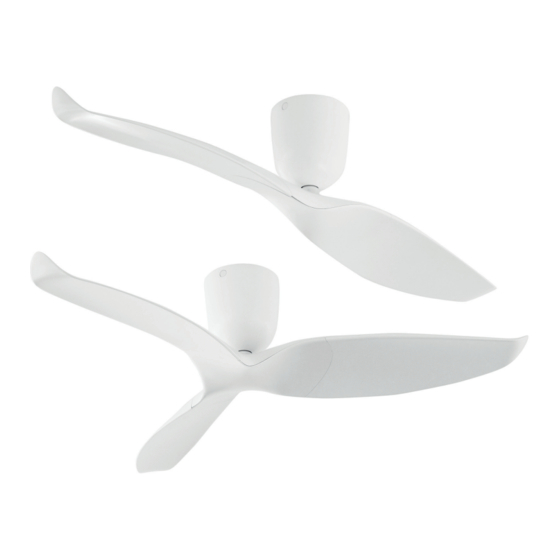AerAtron AE+2 50 Інструкція з експлуатації - Сторінка 15
Переглянути онлайн або завантажити pdf Інструкція з експлуатації для Вентилятор AerAtron AE+2 50. AerAtron AE+2 50 18 сторінок.

Care and Cleaning
Regular cleaning of the Aeratron Ceiling fan blades and fan motor housing is the only maintenance needed.
Due to the self-balancing design, a large build up of dust on blades may create an imbalance in extreme cases
only, causing the blades to wobble during use. This is likely to be more apparent on fans with an extension rod.
Regular cleaning of the blade is recommended to prevent dust from building up.
1. When cleaning your fan, only use a soft brush or lint free cloth to avoid scratching the finish. DO NOT
use water when cleaning your ceiling fan. It could damage the motor or blades and/or create the
possibility of electric shock.
2. When dusting the blades, they must be supported to prevent bending - no pressure should be applied
to the blade pivot. After cleaning the blades, check to ensure that the Drive Shaft is vertical, otherwise
the fan may wobble.
3. Occasionally, it may be necessary to re-tighten the fan blades/screws to prevent any clicking or
humming sounds during operation. This is especially true in climates with broad temperature and
humidity ranges.
4. If you experience any flaw in the operation of your fan, please check the points in the Trouble Shooting
section below.
Troubleshooting
Except for items 1 to 3 below, the following require access to
areas of the fan which carry lethal voltage and must be carried
!
out by properly qualified personnel. ONLY points 1 to 3 below can
be carried out by the user.
If the fan does not operate properly, or turns on or off at random.
1.
It is normal that the fan is rotating backwards/forwards till finds the direction of rotation.
Make sure that the blades are attached when testing the fan, the motor is NOT rotating without the
blades attached
2. If applicable, change the batteries in the Remote Control (Handset).
3. Re-pair the remote using steps 3&4 (page 7)
4. Multiple fans: disconnect power to all fans, wait for a minimum of 10 seconds before switching
power back on to all the fans (see page 7)
5. Disconnect and reconnect the 3-pin connector (receiver to motor) to make sure that the
connectors are fully engaged (see page 6)
6. Check the main and branch circuit breakers and/or fuses.
7. Check the wire connections to the fan.
8. Other RF devices may obstruct the handset to receiver signal.
If the fan is noisy
9. Check to make sure that Suspension Ball is located in the slot correctly, and the one screw
securing the suspension ball is tight (see page 5).
10. Check that Hanger Bracket is solidly mounted, no movement allowed (see page 4)
11. Check that the 2 Hub screws per fan blade are tight and firm (see page 8)
12. Excess wind can lift the fan blades and result in some noise.
If the fan rotates but does not create much airflow
13. The room may contain items which obstruct the air-flow.
14. The fan may be too small for the size of the room.
15. The fan might be in reverse function (counter clockwise rotation)
Note: In some areas, signals are sent through the power lines by the electricity supplier for the control of
off peak hot water, street lights and so on. These signals may cause an intermittent humming in the ceiling
fan. Filters may be available in your country at customer costs. It is not a ceiling fan fault.
13
